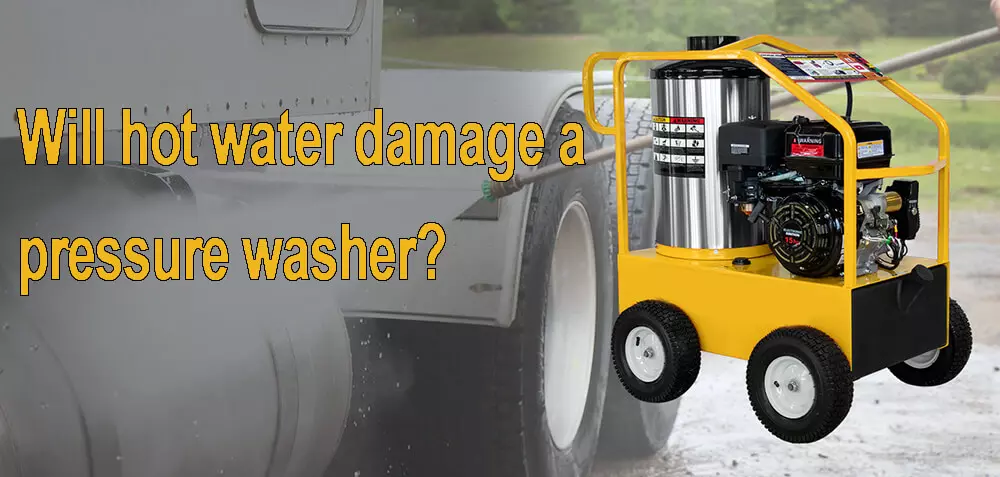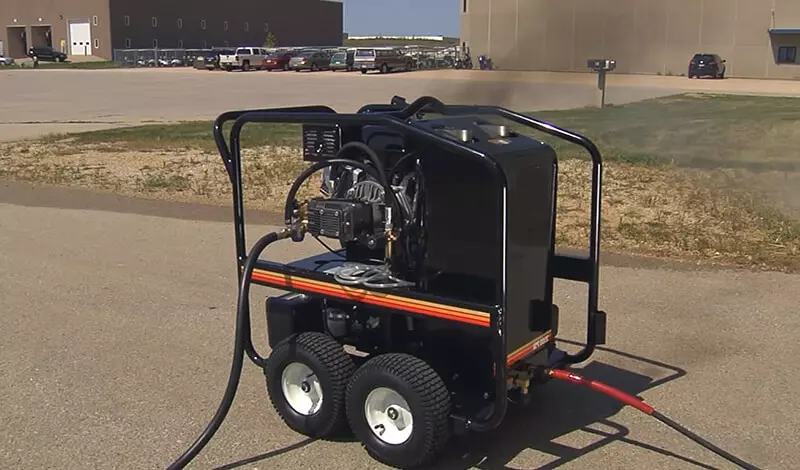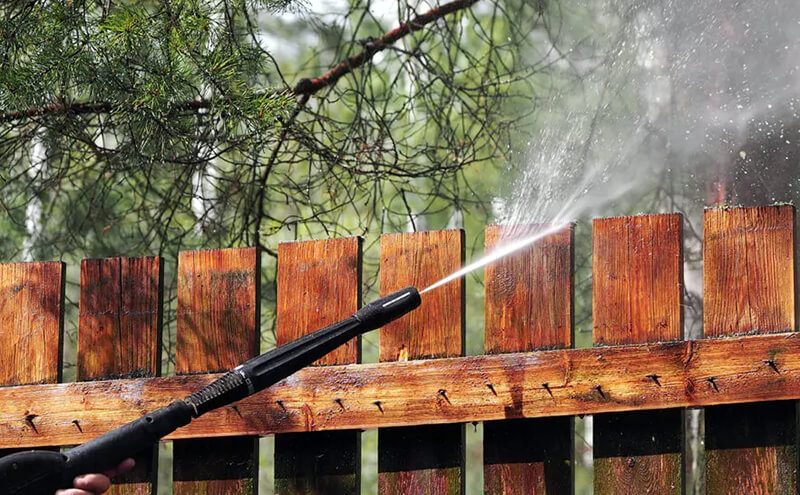27Aug 2024
table of contents

Pressure washers are highly flexible and potent tools which greatly simplify the cleaning process, ranging from personal vehicles and home driveways to commercial structures and industrial machinery. They are of immense benefit whether you're a home owner struggling with deep seated grime or a professional tasked with maintenance. However, a common query often arises: is a pressure washer susceptible to damage from hot water?
In this araticle, we will meticulously examine this critical subject, discussing the subtleties of using hot versus cold water, the advantages of employing a hot water pressure washer, appropriate conditions for its use, and if hot water could potentially pose a threat or harm your gear. As you continue reading, you'll gain insights about considerations involved in selecting pressure washer and advice on safe usage practices. This is aimed at enabling you to maximize utility of your pressure washer while avoiding any potential harm.
Implementing hot water in pressure washer can notably enhance cleaning effectiveness. However, it is of paramount importance to ensure that your equipment is capable of withstanding associated heat. It's worth noting that not every pressure washer is designed for hot water use and misjudged handling can potentially impair device.
Pressure washers fall mainly into two types: hot water and cold water pressure washers. Both types cater to distinct purposes and function differently to satisfy diverse cleaning needs.
Most standard cold water pressure washers aren't equipped to manage hot water, and typically operate at water temperatures as high as 140°F (60°C). Employing water that exceeds a certain temperature can harm seals, hoses and other parts, leading to decreased performance or outright machine breakdown. These pressure washers excel at typical cleaning tasks such as washing your vehicle, tidying up your driveway or cleansing your patio furniture. Owing to their affordability and less demanding maintenance compared to hot water pressure washers, they stand as a favored pick for home users and minor commercial functions.
On the other hand, hot water pressure washers are intricately constructed to endure elevated temperatures, warming water prior to expelling it at intensified pressure. These units can conventionally deal with water heat levels, ranging from 180°F (82°C) to 200°F (93°C) or more, contingent on the precise model and manufacturing guidelines.
Advantages of using hot water pressure washer
When juxtaposed with cold water pressure washers, hot water pressure washers offer a plethora of advantages, especially in distinct cleaning scenarios.
Enhanced cleansing efficiency: Hot water's thermal quality has an edge in breaking down grease effectively, which aids easy eradication of stubborn dirt and deposits.
Decreased reliance on detergents: The heat generated supports breakdown of grime and oil, thereby easing or potentially eliminating need for chemical cleansers, which is economical and environmentally friendly.
High temperature sterilization: Hot water is effective in eliminating bacteria and other harmful microorganisms, which makes it ideal for places where need a higher standard of cleanliness, such as commercial kitchens, hospitals and food manufacturing centers.
Faster drying times: As the high temperature stimulates faster water evaporation, surfaces cleared with hot water tend to dry more quickly.

Eliminating oil and grease: Perfect for cleansing automobile components, machinery and industrial equipment that often gather oil and grease.
Heavy industrial cleaning: Ideally suited for manufacturing facilities, construction zones, and other industrial settings where persistent dirt and residues occur.
Sanitization requirements: Critical for settings that demand high hygiene levels, such as medical facilities, food production facilities and commercial kitchen spaces.
Erasing graffiti: Hot water tends to be more efficient to erasing graffiti from different surfaces, particularly when used in conjunction with suitable cleaning solution.
It's important to note that although hot water pressure washers are potent solutions for certain cleaning tasks, their operational costs can be higher because of energy needed to heat water. However, the benefits in cleaning efficiency are often worth extra cost.
There are also potential risks with using a hot water pressure washer, damage to internal components:
Seals and gaskets: Typically, seals and gaskets in pressure washer is composed of rubber or assorted synthetic substances. In intense heat might cause stiffen, form cracks or lose their flexibility. In the long run, this could result in fluid leakage and declining pressure, which can compromise performance and safety of your pressure washer.
Pump damage: High-quality pressure washer pumps that are not heat-resistant cannot withstand high temperatures. Hot water causes thermal expansion and contraction of pump components, causing them to warp or become misaligned. And eventually appear to reduced efficiency, accelerated deterioration and pump failure.
Degradation of hoses: Rubber or fortified plastic materials used in the pressure washer hoses can be weakened by high temperature water, making them susceptible to brittleness, tearing or even complete rupture under high pressure. Continuous contact with hot water drastically reduces hose's lifespan, necessitating more regular replacements.
Electrical system risks: A pressure washer’s electrical components (such as switches, wires, and motors) are typically insulated and designed to handle moisture and standard operating temperatures. However, exposure to hot water can affect the insulation, potentially causing electrical shorts or failures. In severe cases, this could create a fire hazard or cause user to receive an electric shock.
To mitigate these risks, if you need to work at high temperatures, you must use a pressure washer designed for hot water applications. For example, BISON hot water pressure washer!

So how to select correct pressure washer for your needs? The decision hinges on several variables, such as the intended cleaning task, storage capacity at your property, as well as your specific feature requirements. As mentioned earlier, hot water pressure washer possess more functionalities. If your cleaning needs revolve around particularly stubborn materials, or you need extremely thorough cleaning, hot water pressure washer would be more suitable for you. Conversely, cold water pressure washer are more suffice for lighter cleaning tasks.
Practical tips for safe use
Prior to use, verify your equipment: Ensure that your pressure washer is designed to handle hot water. Consult manufacturer's guidelines to confirm its suitability.
Managing temperatures: Use water at the prescribed temperature for your specific pressure washer model. Refrain from surpassing manufacturer's highest temperature boundaries, to avert the onset of overheating and potential harm to pressure washer.
Routine maintenance: Perform a thorough inspection of pressure washer before each use. Remove any debris or buildup that may block water flow. Also store pressure washer in a cool, dry place. Ensure to empty and dry the machine following each usage, particularly when used with hot water, as a measure to thwart onset of rusting and corrosion.
Selecting the appropriate pressure washer coupled with useful tips can greatly improve cleaning functionality, guarantee safety and prolong equipment's lifespan. It's critical to perform routine care and upkeep, especially with the use of hot water, in order to mitigate potential hazards and uphold peak operating efficacy.
Ready to transform your cleaning habits with the power of hot wate pressure washer? Discover the unparalleled efficiency and reliability of BISON hot water pressure washers today. Invest in quality, improve cleaning efficiency and experience the difference. Visit BISON website or contact us to learn more and make a purchase!
inquiry form here
BISON BLOG, All the latest news and views from Bison Machinery.